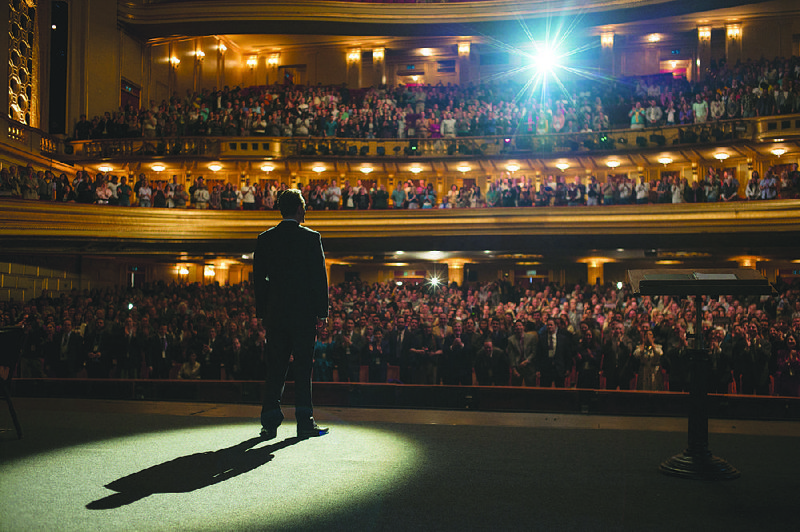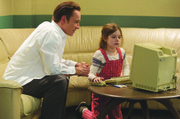Clearly, Apple co-founder Steve Jobs is the kind of subject glitzy Hollywood bio-pics are made for: an exacting, brilliant, difficult marketing genius who also happened to be a savant of a high-tech future only he and his team could envision. He was the helmsman behind a wildly successful corporate titan with unprecedented cultural cachet, who died far too young and left a legacy equal parts dazzling and confounding.
Given that, it's not hard to fathom why filmmakers have been so drawn to him, even if the previous results have been mixed (not even to mention Alex Gibney's documentary Steve Jobs: The Man in the Machine, released earlier this year). The first such narrative foray, Jobs, released in 2013, starred an ill-cast Ashton Kutcher as the man, and an equally misplaced Josh Gad as Steve's original partner, Steve Wozniak. Jobs treats its subject with undue reverence, a kingpin of the modern era, and gets caught in the trappings of the man -- his black turtleneck, "reality distortion machine" presence, his ruthless business acumen -- rather than his considerable essence.
Steve Jobs
83 Cast: Michael Fassbender, Kate Winslet, Seth Rogen, Jeff Daniels, Michael Stuhlbarg, Katherine Waterston, Perla Haney-Jardine, Makenzie Moss
Director: Danny Boyle
Rating: R, for language
Running time: 122 minutes
The newest treatment -- an all-star affair, helmed by Oscar-winner Danny Boyle, written by Oscar winner Aaron Sorkin, and featuring a bevy of big stars, including Michael Fassbender as Mr. Jobs -- certainly tries its best to capture its subject without glossing over his various brusque shortcomings, but a certain critical element of the film keeps it from ever taking flight.
Even fans of Mr. Sorkin, whose signature style -- involving fast-talking, unnaturally verbose characters rapid-firing across one another under the auspices of emotional servitude -- has now practically been trademarked, have to grudgingly admit he is appearing more and more to be stuck in a rut entirely of his own making. Since the heady days of his Academy-award winning screenplay for The Social Network, Sorkin helmed the ultimately disappointing HBO series The Newsroom, which featured three seasons of Jeff Daniels as an all-knowing news oracle who gave America the straight truth, the Brad Pitt baseball vehicle Moneyball, and precious little else. This script, mannered, overly structured and ultimately facile, will do little to restore his former luster.
The film is divvied up into three acts, but Sorkin's primary gimmick is to set each roughly 30-minute act in the chaotic moments right before Jobs is about to lead one of the company's vastly important product "reveal events." The first, set in 1984, scant days after their infamous Ridley Scott-directed 1984 Super Bowl commercial, comes before he's about to introduce the Apple Macintosh, an expensive home computer meant to revolutionize the computing experience.
Backstage, Jobs verbally brawls with software designer Andy Hertzfeld (Michael Stuhlbarg) about getting the Mac to work properly for the presentation; orders around the long-suffering Jobs co-conspirator Joanna Hoffman (Kate Winslet); spends quality minutes with his mentor, Apple CEO John Sculley (Jeff Daniels); takes a visit from Woz (Seth Rogen), who respectfully asks that he give props to the Apple II team; and endures a visit from Chrisann Brennan (Katherine Waterston), the young woman who avowed (and later proved via blood test) to be the mother of his daughter, Lisa (played as a young girl by Makenzie Moss), a claim Jobs was at the time still bitterly contesting. In Act I, Jobs is little more than a charismatic bully, slicing through personal relations and shrugging off basic human decency in the service of building a tech empire.
The second act, set in 1988, finds Jobs, now ousted from his beloved Apple, about to introduce the impractically expensive NeXT computer platform, which the film maintains he knew would never sell unto itself, but hoped to leverage its OS in order to convince Apple to buy it, in order to bring him back to the company (a peculiar scheme that actually worked). The same personnel are in play, but Jobs' interpersonal connection to them is badly skewed. Still outraged at his ouster from Apple -- brought about largely by his own impetuousness, the film strongly suggests -- he sees the Apple people there to support him as interlopers with not-so-hidden agendas.
The final act, a decade later as Jobs has been reinstated to the foundering company just in time to save it from complete obsolescence, comes before the release of the fabled iMac, the personal PC that literally saved the company. By this time, he has adopted what we might call the signature Jobs ensemble -- black turtleneck, John Lennon round-framed eyeglasses, plain Levi's, New Balance sneakers -- and we're meant to see how much he has finally grown as a human being, how much closer he is with Lisa (now a Harvard student, played by Perla Haney-Jardine) and how much better suited he is to actually run his company and act as an empathetic human being.
The problem is, with Sorkin delivering such a vehicle steeped in "Sorkinese," with everyone rapid- volleying pithy lines back and forth ("Musicians play their instruments; I play the orchestra," Jobs fires at an incredulous Woz at one point), and the cheapened emotional dynamic that his groaning, manipulative structure dictates, everything ultimately becomes a distraction from Boyle's film. Like having a celebrity chef cater a child's birthday party, Sorkin's constant, blatant storytelling manipulations supersede and overwhelm the film's supposed subject. In this structure, we are spared any Jobs deathbed scenes (in fact, the film closes out before he's even stricken with the cancer that would ultimately take his life), but in their place is an equally mawkish father-and-daughter scene on a rooftop that more or less achieves the same trite effect.
Even the all-star cast is held in check by Sorkin's quippy dialogue (another sample: "I sat in a garage and invented the future because artists lead and hacks ask for a show of hands!") and shameless emotional exploitations. As good and compelling as Fassbender and Winslet can be, you can practically feel the tight glass walls of the tiny phone booth they've been stuffed into for their roles. For all the film's lip service to the man behind Apple and the computer he brought to the world, here his life and his work is reduced to little more than dramatic fodder for a different sort of device, the Sorkin Dramatic Narrative Machine. Talk about a spinning pinwheel of death.
MovieStyle on 10/23/2015

